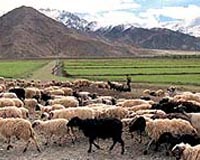 |
Calgary, Canada (SPX) Aug 19, 2009 Scientists at the University of Calgary have found that methane emission by plants could be a bigger problem in global warming than previously thought. A U of C study says that when crops are exposed to environmental factors that are part of climate change - increased temperature, drought and ultraviolet-B radiation - some plants show enhanced methane emissions. Methane is a very potent greenhouse gas; 23 times more effective in trapping heat than carbon dioxide. "Most studies just look at one factor. We wanted to mix a few of the environmental factors that are part of the climate change scenario to study a more true-to-life impact climate change has on plants," says David Reid, a professor in the Department of Biological Sciences who co-authored a paper with research associate Mirwais Qaderi in the advanced on-line edition of the journal Physiologia Plantarum. Reid and Qaderi, who received funding from the University Research Grants Committee (URGC) and Natural Sciences and Engineering Research Council of Canada (NSERC), analyzed methane emissions from six important Canadian crops - faba bean, sunflower, pea, canola, barley and wheat - that were exposed to combinations of three components of global climate change: temperature, ultraviolet-B radiation and water stress (drought). What they found they say is troubling. These stresses caused plants to emit more methane. In a warmer, drier world methane might be a bigger contributor in global warming than previously thought. When it comes to the greenhouse effect, methane could be considered the misunderstood and often overlooked orphan greenhouse gas. Much of the attention has been focused on carbon dioxide but more recently it has been realized that methane should also be considered as a very significant greenhouse gas. Its concentrations have more than doubled since pre-industrial times. While the growth rate of methane concentrations has slowed since the early 1990s, some scientists say this is only a temporary pause. "Our results are of importance in the whole climate warming discussion because methane is such a potent greenhouse warming gas, says Qaderi. "It points to the possibility of yet another possible feedback phenomena which could add to global warming." Since elevated levels of carbon dioxide has been observed to counteract the negative effects of some environmental stresses, Qaderi and Reid are now studying the effect of increased carbon dioxide with factors such as drought, higher temperature and UVB on methane production in crops. Share This Article With Planet Earth
Related Links University of Calgary Farming Today - Suppliers and Technology
 Global warming good for farming, tourism in Tibet: Chinese official
Global warming good for farming, tourism in Tibet: Chinese officialBeijing (AFP) Aug 18, 2009 Global warming could prove devastating for the Tibetan plateau, the world's third-largest store of ice, but it helps farming and tourism, Chinese state media said Tuesday, citing a leading expert. Qin Dahe, the former head of the China Meteorological Administration, made the comment in an otherwise gloomy assessment of the impact that rising temperatures will have on Tibet, according to the ... read more |
|
| The content herein, unless otherwise known to be public domain, are Copyright 1995-2009 - SpaceDaily. AFP and UPI Wire Stories are copyright Agence France-Presse and United Press International. ESA Portal Reports are copyright European Space Agency. All NASA sourced material is public domain. Additional copyrights may apply in whole or part to other bona fide parties. Advertising does not imply endorsement,agreement or approval of any opinions, statements or information provided by SpaceDaily on any Web page published or hosted by SpaceDaily. Privacy Statement |